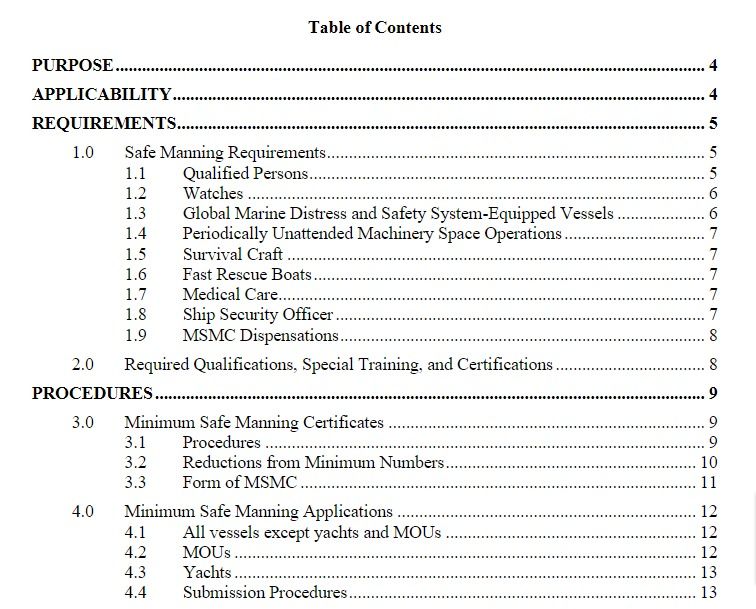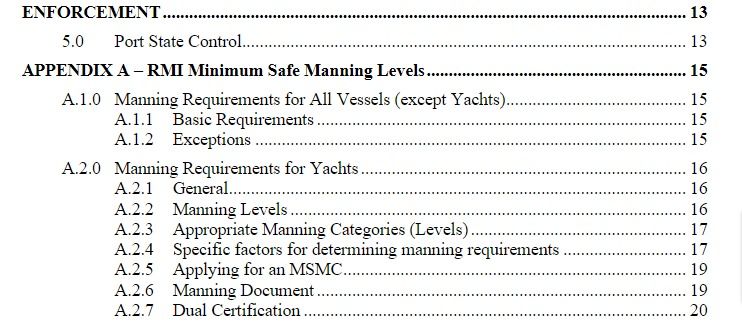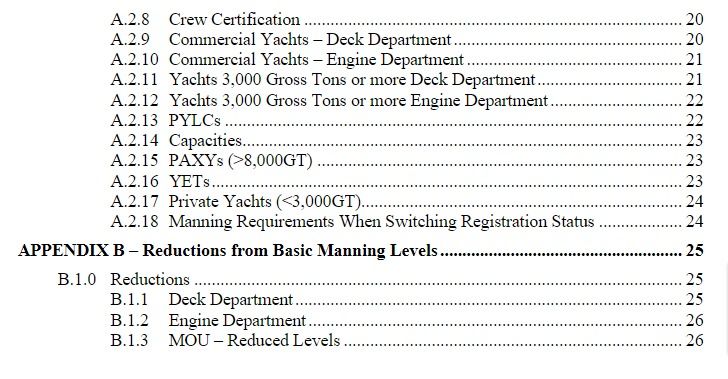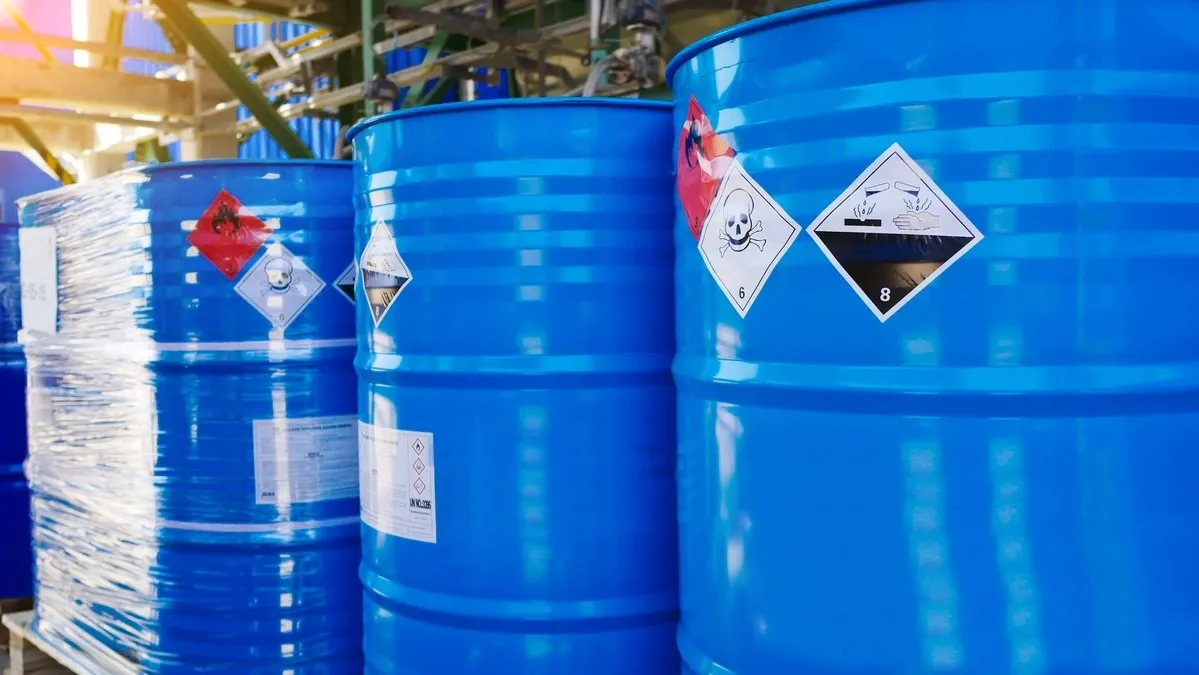The Republic of the Marshall Islands Maritime Administrator released a notice on the minimum safe manning requirements for vessels.
Purpose
This Notice provides the requirements and policies for the safe manning (including minimum levels) of Republic of the Marshall Islands (RMI)-flagged vessels.
This Notice supersedes Rev. May/2023. Section A.2.18 has been added to indicate the manning requirements when switching registration status.
Applicability
This Notice applies to all vessels flagged with, and seafarers certificated or documented by the RMI.
Requirements
1.0 Safe Manning Requirements
The RMI Maritime Administrator (the “Administrator) issues Minimum Safe Manning Certificates (MSMCs) in accordance with the RMI Maritime Regulations (hereinafter the “Maritime Regulations”), §7.38.6.
The Administrator’s requirements on safe manning incorporate the principles of minimum safe manning addressed by International Maritime Organization (IMO) Assembly Resolution A.1047(27).
This Resolution consists of:
- Guidelines for the application of principles of safe manning;
- Guidelines for determination of minimum safe manning;
- Responsibilities in the application of principles of minimum safe manning;
- Guidance on contents and model form of minimum safe manning document; and
- Framework for determining minimum safe manning, as set out in Annexes 1, 2, 3, 4, and 5, respectively, to the present resolution.
1.1 Qualified Persons
- .1 Minimum safe manning levels address the number of seafarers required to ensure that a ship is sufficiently, effectively, and efficiently manned as per the Maritime Regulations, §7.38 and §7.51, and considering the guidelines in IMO Assembly Resolution A.1047(27).
- .2 Vessel operators must ensure there are enough qualified personnel on board the vessel to safely handle all expected operations in addition to watch-standing duties. This is especially important for short-sea voyages of 24 hours or less, sea trials, or any other testing experiments, to the extent seafarers are involved in these activities. Additional operations to consider for manning requirements include, but are not limited to:
- a. mooring or unmooring;
- b. tank cleaning;
- c. cargo hold preparation; and
- d. cargo operations.
- .3 Vessel operators must ensure there are enough qualified personnel on board to make up required watch schemes plus the general vessel surveillance, such as fire and security patrols, and investigation of unusual noises.
- .4 The issuing of an MSMC does not mean that a vessel may not be towed, or where appropriate for safety reasons, moored or anchored in an unmanned condition. In all cases, the principles of §1.1.2 apply.
1.2 Watches
- .1 The company responsible for the ship’s operation must ensure that all watchstanders on board its vessels receive the minimum required rest hours in accordance with international regulations.
- .2 Except on ships of limited size, the master and chief engineer must not make up part of the regular vessel watchstanding scheme.
- .3 A three-watch system must be used for both navigational and engine room watches on all ships, except those of limited size.
- .4 A two-watch system may be used to provide continuity with industrial operations, provided these are not extended in length.
- a. Mobile Offshore Units (MOUs) and other vessels operating in support of offshore activities may adopt a two-watch system to provide continuity with industrial operations.
- b. In all cases the requirements for work and rest hours must be met.
- .5 For bridge watches, a routine for providing additional assistance without delay must be established. Standby personnel must be identified and immediately contactable.
1.3 Global Marine Distress and Safety System-Equipped Vessels
- .1 For vessels operating without a Global Marine Distress and Safety System (GMDSS) Radio Maintainer on board, at least two deck officers must hold a General Operator’s Certificate.
- a. One of the operators must be assigned the primary responsibility for radio communications during distress incidents. In this case, the duplication of onboard equipment and shore-based maintenance must be employed by the vessel owner or operator for the designated area of operation.
- b. For vessels operating solely in Sea Area 1*, GMDSS operators may hold Restricted Operator’s Certificates.
- .2 For vessels sailing without at least two deck officers holding General Operator’s Certificates, a dedicated Radio Maintainer must be on board who holds either a First-Class or Second-Class Radioelectronic Certificate.
*Sea Area 1 is an area within the radiotelephone coverage of at least one Very High Frequency (VHF) coast station in which continuous digital selective calling alerting and radiotelephony services are available, as defined by the IMO.
- a. They must be designated as primarily responsible for radio communications during distress incidents.
- b. In this case, either the duplication of onboard equipment or shore-based maintenance must be employed by the vessel owner or operator for the designated area of operation.
- .3 Training of personnel to be qualified in GMDSS operations must be in accordance with IMO Assembly Resolution A.703(17).
1.4 Periodically Unattended Machinery Space Operations
On vessels certified for periodically unattended machinery spaces, a sufficient number of qualified personnel must be carried to provide manual control of machinery in an emergency to enable the vessel to reach port. See also §1.2.2.
1.5 Survival Craft
- .1 In accordance with the International Convention for the Safety of Life at Sea (SOLAS), III-10, a deck officer or certificated person must be placed in charge of each survival craft.
- .2 However, the Administrator, having due regard to the nature of the voyage, the number of persons on board, and the characteristics of the ship, may permit persons practiced in the handling and operation of liferafts to be placed in charge in lieu of persons qualified as above.
- .3 A second-in-command must be nominated for lifeboats. There must also be enough trained persons on board to muster and assist, as well as someone assigned to each motorized survival craft who is capable of operating the engine and carrying out minor adjustments.
1.6 Fast Rescue Boats
Fast rescue boats must be crewed by at least two survival craft or rescue boat crew members who have been specially trained and additionally certificated per the Seafarers’ Training, Certification and Watchkeeping (STCW) Code, Section A-VI/2 and Table A-VI/2-2.
1.7 Medical Care
One person on board must be appointed and certified to be the “Person in Charge of Medical Care” as defined in STCW Code, Section A-VI/4 and Table A-VI/4-2.
1.8 Ship Security Officer
There must be a designated crew member on board each vessel who is appropriately trained and certified and accountable to the Master for the security of the vessel, including implementation and maintenance of the Ship Security Plan (SSP).
1.9 MSMC Dispensations
- .1 When a vessel is unable to meet the manning required in its MSMC, the Administrator may issue a dispensation letter in accordance with Article VIII of the International Convention on the Standards of Training Certification and Watchkeeping for Seafarers (STCW Convention).
- .2 A dispensation letter will only be issued if the operator can demonstrate, to the satisfaction of the Administrator, that the vessel can be operated without compromising safety, its crew, cargo, and the environment.
- .3 A dispensation letter will not be issued for more than one seafarer in the same department unless the operator can demonstrate an extreme circumstance, and then only for a minimal amount of time.
- .4 A dispensation letter may be issued only where a vessel is unable to meet the manning levels required by its MSMC before it must depart a port. The Administrator will expect that proper manning levels will be restored at the next port of call.
- .5 A letter of dispensation will not be issued unless a duly certified master and a duly certificated Chief Engineer holding an RMI Certificate of Competence or an endorsement are employed on board.
2.0 Required Qualifications, Special Training, and Certifications
Besides the general safe manning requirements described above, there are specific functions requiring special training and certification that must be filled by crew members serving on board.
These capacities are defined in the STCW Convention, and the requirements spelled out in the STCW Code.
They are implemented by the Administrator in the RMI Seafarer Certification Requirements (MI-118).
For further detail on proficiencies requiring special training, see §5.0 of the MI-118.
This notice was released on 1 September 2023.



For more information, please see the documents below (available only to subscribers):
Minimum Safe Manning Requirements for Vessels
A.1047(27): Principles of Minimum Safe Manning
A.703(17): Training of Radio Personnel in the Global Maritime Distress and Safety System (GMDSS)

Sign up for our newsletter
Your most up-to-date maritime regulations news
It's free. No spam. Cancel anytime.










Related News
Hong Kong: Collision in Suez Canal and safety measures
Jul 26, 2024
Updated STCW certification rules for Cayman Islands ships
Jul 22, 2024
India: Update on maritime training course IDs and introduction of new bridging courses
Jul 19, 2024